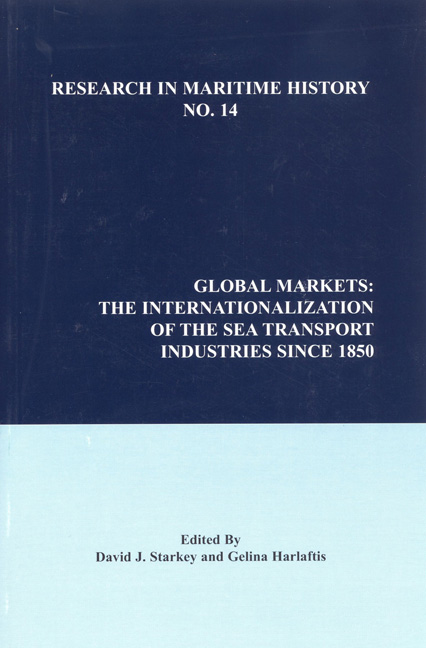Book contents
- Frontmatter
- Contents
- About the Editors
- Contributors
- Introduction
- “International Freight Markets in the 1830s and 1840s: The Experience of a Major Finnish Shipowner”
- “The First (and Very Secret) International Steamship Cartel, 1850-1856”
- “Competition or Co-operation in the Global Shipping Industry: The Origins and Impact of the Conference System for British Shipowners before 1914”
- “National Alliances and Global Webs: The Internationalization of Japanese Shipping”
- “Dutch Sea Transport in Transition: The German Hinterland as Catalyst, 1850-1914”
- “The Expansion of American Interests in Transatlantic Commerce and Trade, 1865-1893”
- “The Expansion of Japan's Shipping Interests before the Sino-Japanese War”
- “Cooperation and Reorganization on the North-South Routes from Japan in the Interwar Period”
- “The Global Communications Industry and Its Impact on International Shipping before 1914”
- “The Nineteenth-Century Roots of Globalization: Some Technological Considerations”
- “The Global Fish Market: Internationalization and Globalization, 1880-1997”
- “Convergence or National Styles? The Japanese Challenge to the British-Norwegian Hegemony in the Twentieth-Century Whaling Industry”
- “International Trends and Greek Shipping: The Business Strategy of Demetrios Moraitis, 1893-1908”
- “Organizational and Managerial Patterns of Greek- Owned Shipping Enterprises and the Internationalization Process from the Internar Period to 1990”
- “Internationalization and the Collapse of British Shipbuilding, 1945-1973”
- “Globalization and International Competitiveness: The Experience of the Japanese Shipping Industry since the 1960s”
- “Containerization and the Globalization of Liner Shipping“
“The Global Communications Industry and Its Impact on International Shipping before 1914”
- Frontmatter
- Contents
- About the Editors
- Contributors
- Introduction
- “International Freight Markets in the 1830s and 1840s: The Experience of a Major Finnish Shipowner”
- “The First (and Very Secret) International Steamship Cartel, 1850-1856”
- “Competition or Co-operation in the Global Shipping Industry: The Origins and Impact of the Conference System for British Shipowners before 1914”
- “National Alliances and Global Webs: The Internationalization of Japanese Shipping”
- “Dutch Sea Transport in Transition: The German Hinterland as Catalyst, 1850-1914”
- “The Expansion of American Interests in Transatlantic Commerce and Trade, 1865-1893”
- “The Expansion of Japan's Shipping Interests before the Sino-Japanese War”
- “Cooperation and Reorganization on the North-South Routes from Japan in the Interwar Period”
- “The Global Communications Industry and Its Impact on International Shipping before 1914”
- “The Nineteenth-Century Roots of Globalization: Some Technological Considerations”
- “The Global Fish Market: Internationalization and Globalization, 1880-1997”
- “Convergence or National Styles? The Japanese Challenge to the British-Norwegian Hegemony in the Twentieth-Century Whaling Industry”
- “International Trends and Greek Shipping: The Business Strategy of Demetrios Moraitis, 1893-1908”
- “Organizational and Managerial Patterns of Greek- Owned Shipping Enterprises and the Internationalization Process from the Internar Period to 1990”
- “Internationalization and the Collapse of British Shipbuilding, 1945-1973”
- “Globalization and International Competitiveness: The Experience of the Japanese Shipping Industry since the 1960s”
- “Containerization and the Globalization of Liner Shipping“
Summary
Globalization has become the buzzword of the 1990s. Beginning in the mid-1980s almost every popular or scholarly publication dealing with topics of a worldwide dimension will at one stage or the other resort to the term, taking for granted that the reader is familiar with the concept of globalization. Various definitions have been put forward and I shall not try to add a further definition of that multifaceted phenomenon. In my context it is sufficient to note that globalization is a worldwide network of economic activities transgressing the boundaries of two states. Globalization began with the expansion of European culture across the planet in the age of discovery after the so called “dark middle ages” had come to an end. It was the ship that facilitated the conquest of the globe and it was the ship that helped to create a world economy. Authors like Barraclough, Robertson and Waters emphasized the instrumental importance of the development of transportation and communication networks that physically linked together different parts of the planet, especially by railways, shipping and the telegraph. A second key feature in this process was the rapid growth of trade between Western Europe and the rest of the world. This exchange of commodities and services accelerated during the industrial revolution in Britain and Continental Europe throughout mid and late nineteenth century.
In 1972, Borchardt defined the “Industrial Revolution” as the process by which the economic emphasis shifts from old, primary sectors to new sectors, especially towards manufacturing industry. To characterize the nineteenth century and avoid the term “industrialization,“ Borchardt observed that it should be termed the century of “revolution in communications.” While the production of commodities increased enormously, the transportation of goods, people, news and capital grew even more impressively. This rise in transportation was not the outcome of the huge advances in production and productivity during the nineteenth century; rather, it was one of the pre-requisites of such growth. Mass production and bulk sales could not have taken place without railways, steamships and telecommunications.
Although the label “industrial revolution” is generally used, it is commonly understood as referring to an evolutionary process consisting of various components which interacted to transform the basis of economic life, first in Britain, later in continental Europe and North America.
- Type
- Chapter
- Information
- Global MarketsThe Internationalization of The Sea Transport Industries Since 1850, pp. 195 - 216Publisher: Liverpool University PressPrint publication year: 1998



